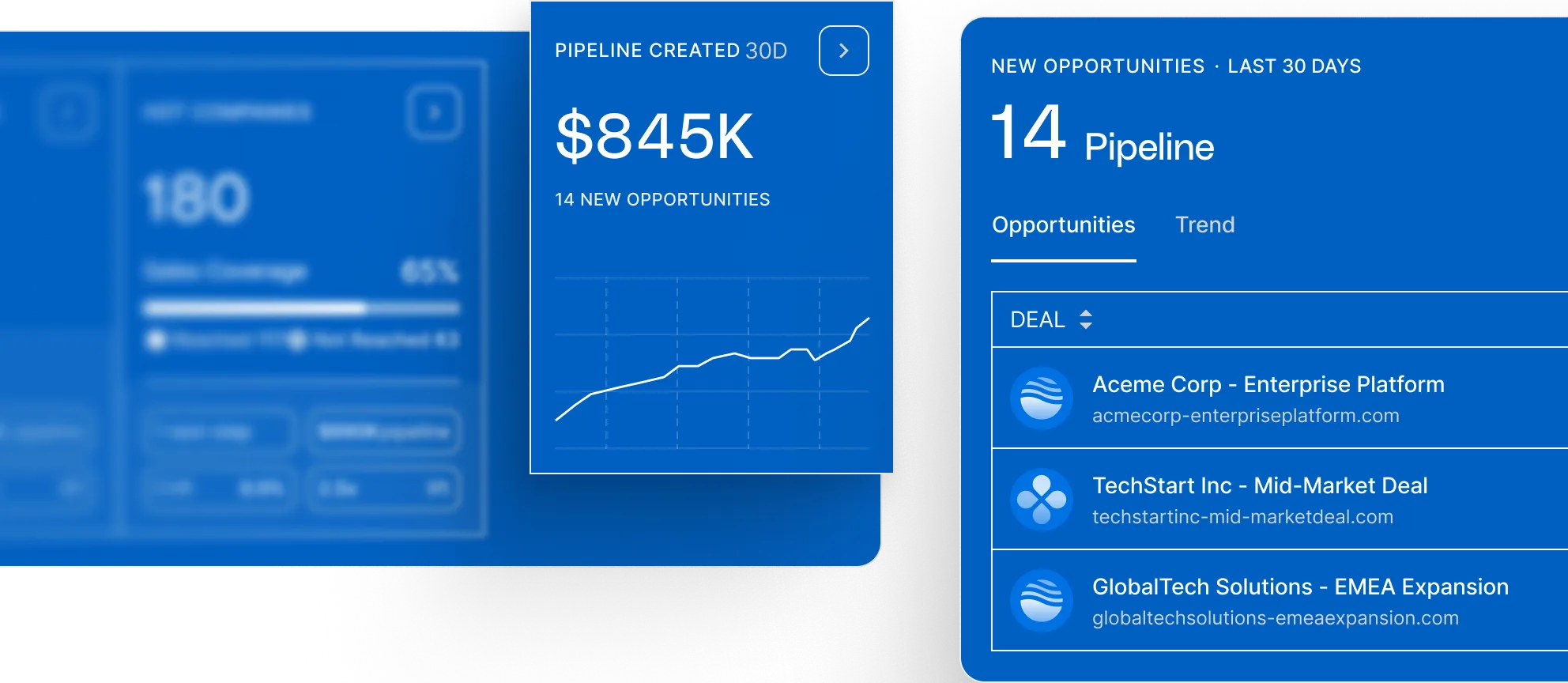15 Best Marketing Account Intelligence Software for B2B Teams

15 Best Marketing Account Intelligence Software for B2B Teams
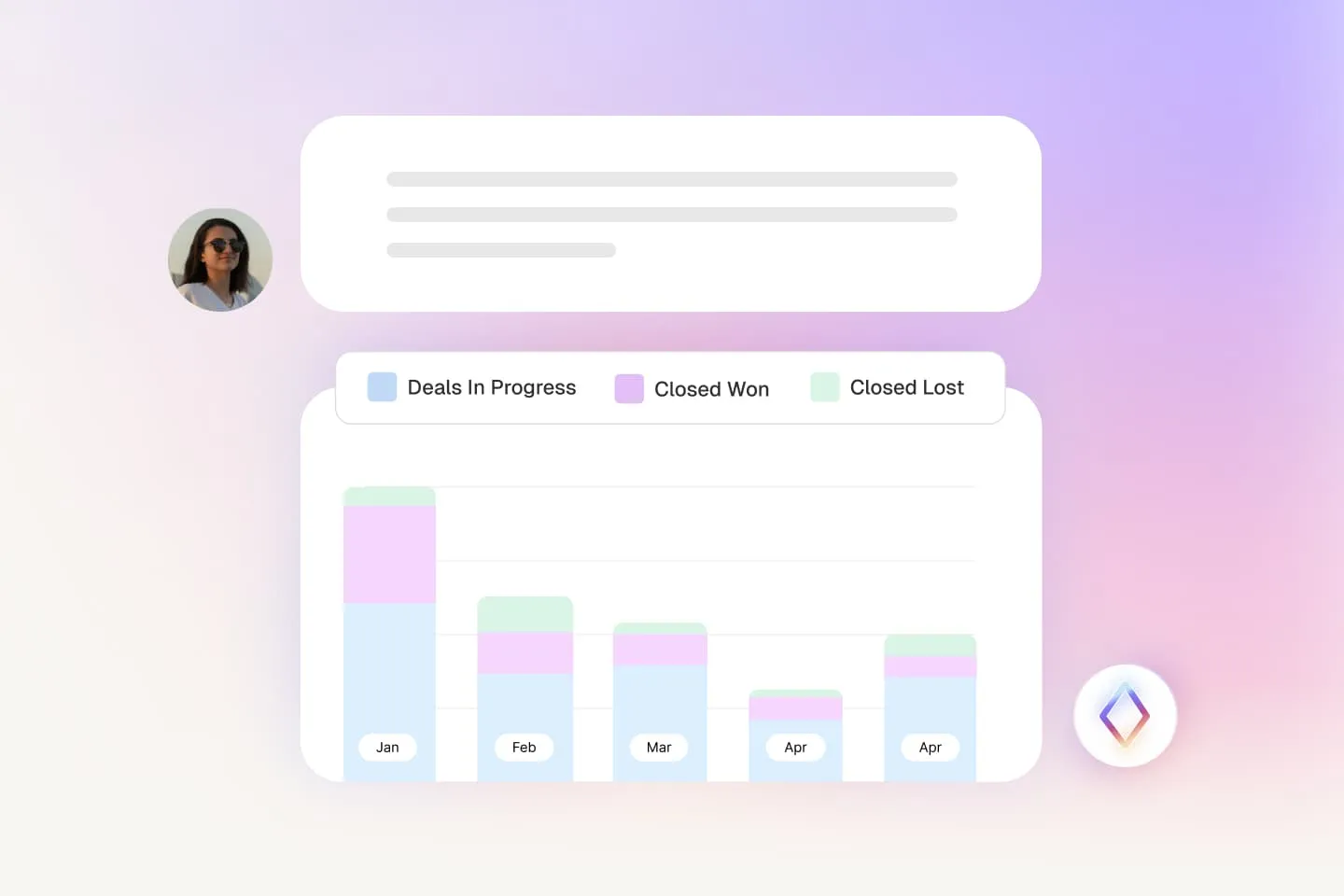
It’s easy for software to look great in a pitch deck. But when you’re investing in marketing account intelligence, you can’t afford a tool that only sounds good.
Sure, their websites show perfect customer profiles, smooth integrations, and AI insights that make targeting your ideal accounts look like a breeze. But when the slick sales demos wrap up and real implementation begins, that's when things get messy.
To prepare for this guide, we read through hundreds of user reviews across G2, TrustRadius, and Reddit threads.
We analyzed how each tool actually performs post-implementation—how reliable the data is, how clean the UI feels, how well it integrates with existing CRMs and marketing stacks.
Also, we looked at customer support, contract transparency, and what companies say after 6+ months of use. Our goal was to see how these tools actually perform once the honeymoon period ends.
This research gives you an honest look at which account intelligence tools are truly delivering value to B2B teams today.
Key Features to Look for in Marketing Account Intelligence Platforms
There’s no shortage of tools claiming to offer account intelligence, but only a few deliver real, usable insight.
Here’s what to watch for when deciding which one’s worth your time (and budget):
Data Integration and Enrichment
Good account intelligence platforms pull data from every channel that matters, including your CRM, website, social channels, and third-party sources. They fill in the gaps in your existing customer records and add key details like company size, technology stack, and decision-maker information.
Account and Contact Discovery
Finding new accounts that match your ideal customer profile shouldn't require endless manual searching. Strong platforms give you access to vast databases of companies filtered by the criteria that matter to your business.
Intent Data Monitoring
Market intelligence platforms track online behavior across thousands of sites to spot research signals and patterns that show buying interest. They alert you when target accounts show heightened interest in topics related to your solutions, so your team can prioritize outreach to the most receptive prospects.
Account Identification
Top platforms can outline which companies are browsing your site, even if visitors never fill out a form. They show you which pages these accounts view, how long they stay, and how often they return, which are all incredibly valuable interest signals.
Lead-to-Account Mapping
When multiple leads from the same company hit your funnel, lead-to-account mapping ensures they're grouped correctly under a single account view. Sales teams can avoid disjointed outreach and finally understand the full context of account engagement.
Account and Lead Scoring
The leading platforms analyze dozens of signals (from engagement patterns to firmographic fit to recent buying behavior) and outline the accounts most likely to convert. They constantly refine these predictions based on which accounts become customers, getting smarter with every closed deal.
AI-Driven Insights and Analytics
Artificial intelligence features in account intelligence software analyze patterns across huge datasets—your pipeline history, campaign engagement, customer lifecycles—to spot which types of accounts convert faster, churn less, or buy more.
Real-Time Alerts
Whether it’s a spike in intent around a high-priority topic, a return visit to your pricing page, or an exec from a target account engaging with your content, real-time alerts help reps reach out at the right moment, with the right context.
Account Segmentation
The best platforms group accounts based on meaningful criteria (e.g., industry, size, funnel stage, product interest, buying signals, and more) and then automatically update those groups as conditions change.
Integration Capabilities
Leading platforms offer native integrations and flexible APIs so that data enrichment, scoring, and buying signals show up in workflows without friction. For example, an SDR might see a contact’s intent spike, technographic data, and recommended talking points, all embedded inside their sales engagement tool.
Reporting and Dashboards
Good MAI platforms come with flexible ABM dashboards that help you track how target accounts are engaging across touchpoints, what’s driving pipeline movement, and where drop-offs are occurring.
Things to Consider When Choosing a Reliable Marketing Account Intelligence Tool
With so many tools on the market, it’s easy to get distracted by flashy features. These are the factors that actually matter when choosing a platform you can rely on long-term:
Data Quality, Accuracy, and Scope
Verify coverage in your specific target industries and regions, as many platforms have major blind spots outside North America.
Ask pointed questions about how often their data refreshes, how they validate information accuracy, and what happens when conflicting data appears from different sources.
Feature Set and Relevance
It’s not about how many features the tool offers, but whether they support your actual use cases. A platform with amazing technographic data isn't helpful if you sell to HR departments. Match features to your specific sales motion rather than assuming more features equal better value.
Integration Capabilities
Apart from checking that connectors exist, investigate how deep these integrations go. Can account scores automatically update in your CRM? Do intent signals appear directly in your sales engagement platform? Real integration means intelligence flows directly into the tools where your team already works.
Usability and User Experience
Many platforms fail because they're too complex for daily use by busy sales and marketing teams. Watch for confusing navigation and cumbersome workflows during demos.
The best tools balance sophisticated features with intuitive interfaces that don't require constant re-training or data science expertise to extract value.
Scalability
Make sure you understand any limits on contacts, accounts, or users before committing. Ask about performance degradation with larger data sets and investigate whether pricing models penalize success by dramatically increasing costs as your usage grows.
Customization and Flexibility
Your account intelligence platform shouldn't force you into rigid workflows. The ability to customize scoring models for different products or segments, create territory-specific alerts, and build specialized dashboards for different stakeholders separates flexible platforms from one-size-fits-all solutions.
Analytics and Reporting
Basic metrics won’t cut it. You need reporting that can tie account engagement to revenue outcomes, surface pipeline trends, and support executive-level and tactical decisions. Bonus points if dashboards can be customized by role or function.
Customer Support and Training
Investigate the vendor's onboarding process, available training resources, and ongoing support options. Talk to reference customers about their experience getting teams up to speed and resolving inevitable issues that come up during deployment.
Security and Compliance
Ask about encryption, access controls, data storage policies, and compliance with local and international privacy regulations. This is especially important for global teams.
Pricing and Value
Many platforms advertise low entry points but come with expensive add-ons for key features or charge premium fees for data you actually need. Calculate your potential ROI based on realistic adoption rates and impact metrics rather than best-case vendor projections.
Vendor Reputation and Reviews
Look for detailed reviews on G2, TrustRadius, and Reddit to see how the tool performs post-sale. Case studies and customer logos help, but user feedback reveals what the day-to-day experience looks like.
The 15 Best Marketing Account Intelligence Software on the Market Right Now
If you're ready to find the right tool for your team, start here. We’ve rounded up 15 of the top marketing account intelligence platforms, each with its own strengths, features, and ideal use cases.
- HockeyStack
- HubSpot Marketing
- ZoomInfo
- Adobe Marketo Engage
- BookYourData
- 6sense Revenue Marketing
- Apollo.io
- D&B Connect
- Demandbase One
- LeanData
- Lead Forensics
- Bombora
- RollWorks
- DemandScience
- Lusha
1. HockeyStack
HockeyStack is a leading revenue acceleration platform that B2B companies can use to connect and analyze data across marketing, sales, and product touchpoints, and get a unified view of the customer journey.
Key features
- Industry-best scoring algorithm: The platform includes a sophisticated scoring algorithm that analyzes thousands of buyer journeys to determine which activities are most likely to generate revenue.
- Full account-level journey tracking: HockeyStack stitches together every touchpoint—organic, paid, outbound, partner, and more—at the account level, so you can see exactly how buying committees progress from first touch to closed-won.
- Odin, the AI Marketing Analyst: Odin automatically surfaces patterns, builds reports, and even answers complex marketing questions with plain language prompts. Instead of spending hours slicing data, teams get instant explanations of what’s working, what’s not, and why.
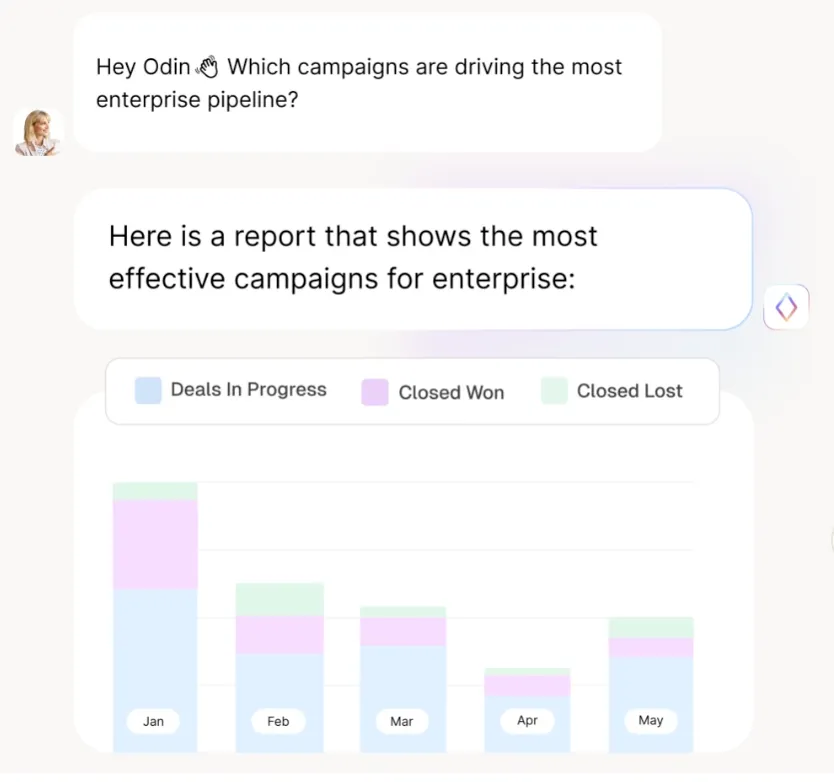
- Custom dashboards and reporting without SQL: With drag-and-drop reporting and flexible dashboards, anyone (from CMO to campaign manager) can create the exact views they need.
- Cookieless tracking: HockeyStack uses proprietary fingerprint tech to track and unify anonymous activity across visits, so you can understand the real buyer journey, even before leads fill out a form.
Advantages of using HockeyStack
- Flexible, no-code customization for every team: Most analytics tools are either too rigid or too technical. HockeyStack lets marketers, RevOps, and even sales leaders build custom reports, define scoring models, segment audiences, and track lift without ever touching SQL.
- True account-level journey tracking that includes outbound and non-cookie sources: Most tools struggle to unify complex B2B journeys, especially when buying committees come through a mix of paid ads, cold outreach, and partner referrals. HockeyStack is purpose-built to stitch those interactions together at the account level, even if users never convert on the first touch.
- Odin’s AI insights actually explain what’s happening: Other platforms might show you pretty charts, but they leave interpretation up to the user. HockeyStack’s AI analyst, Odin, breaks down the “why” behind performance – why a campaign worked, what touchpoints drove revenue, and what’s underperforming.
Here is what real users are saying about the benefits of HockeyStack
- You can drill into dashboards for more actionable insights: Users love that HockeyStack isn’t just high-level graphs and that every metric is clickable, so you can dig deeper into specific accounts, touchpoints, or campaigns. [Read Full G2 Review]
- Variety of use cases for each revenue team: Reviewers mention that HockeyStack works across the entire go-to-market org—marketing can track attribution, sales can get deal signals, and RevOps can analyze funnel velocity. [Read Full G2 Review]
- Unparalleled attribution insights: Users mention how HockeyStack gives a much clearer picture of which channels, campaigns, and touchpoints are actually driving revenue. Compared to tools that stop at MQLs or vanity metrics, HockeyStack connects every interaction to closed-won revenue. [Read Full G2 Review]
What customers are saying about HockeyStack:
- 8x8’s marketing team leveraged HockeyStack to achieve full-funnel visibility, tracking every touchpoint across the customer journey within a single platform. This approach helped them outline which campaigns accelerated deals at each stage. The team can now demonstrate how their campaigns drive sales and prove value to stakeholders. [Read Full Case Study]
- ActiveCampaign cut ad spend by 50% without sacrificing revenue. After switching to HockeyStack, they replaced siloed first-touch reporting with full multi-touch attribution. They now tie LinkedIn impressions and ad views directly to revenue and increased their target account coverage by 900%. [Read Full Case Study]
- Bloomreach moved beyond last-touch attribution and finally linked paid social to pipeline impact. HockeyStack found overlooked channels and gave the team clarity on which contacts and campaigns pushed deals forward. This helped them reallocate budget and beat pipeline goals by 30%.
Who is HockeyStack a good fit for?

HockeyStack is a great fit for B2B SaaS companies with complex sales cycles and multiple stakeholders involved in the buying process.
It’s especially useful for RevOps, marketing, and sales teams that want to unify data across tools, track full account journeys, and make informed decisions without relying on data engineers.
2. HubSpot Marketing
HubSpot Marketing is a full-featured marketing automation platform with built-in account intelligence capabilities that support ABM, lead scoring, and intent-based targeting.
Key features
- Custom company scoring: You can create sophisticated account scoring models based on fit, engagement, and buying stage.
- Account-based marketing workflows: HubSpot's automation engine lets you trigger personalized multi-channel campaigns when accounts show specific buying signals.
- Real-time alerts and notifications: HubSpot notifies reps when a target account revisits key pages, opens an email multiple times, or performs high-intent actions.
Advantages of using HubSpot Marketing
- User-friendly tool for non-tech teams: Users mention that HubSpot’s interface is intuitive, even for those without technical or marketing automation experience. [Read Full G2 Review]
- The HubSpot Academy is quite informative: Many users appreciate the extensive free training resources, especially the HubSpot Academy, which helps new team members get up to speed quickly. [Read Full G2 Review]
- Impressive templates for email marketing: Users say the built-in email templates are professionally designed and easy to customize. [Read Full G2 Review]
What are some limitations of HubSpot Marketing?
- No chat and no phone support: Some users mention frustration with the lack of real-time support options, noting that email-based support can slow down issue resolution when urgent help is needed. [Read Full G2 Review]
- May be confusing for first-time users: Despite its user-friendly design, a few users report that the platform can feel overwhelming at first due to the wide range of features and settings. [Read Full G2 Review]
- Pricing can get out of control: Users often point out that while the starter plans are accessible, costs can rise quickly as you scale, especially if you need access to advanced features or add more contacts. [Read Full G2 Review]
Who is HubSpot Marketing a good fit for?
HubSpot Marketing is a strong fit for mid-sized B2B companies that want an all-in-one platform to manage inbound marketing, lead nurturing, and account-based campaigns without a dedicated ops team.
Pricing
HubSpot Marketing Hub includes the following pricing tiers:
- Marketing Hub Starter: Begins at $15/month per seat, including 1,000 marketing contacts. Additional contacts are billed based on tiered pricing.
- Marketing Hub Professional: Starts at $800/month, with 3 core seats and 2,000 marketing contacts. Additional contacts and seats incur extra charges.
- Enterprise: Priced at $3,600/month, this plan includes 5 core seats and 10,000 marketing contacts. It also requires a one-time onboarding fee of $7,000.
3. ZoomInfo
ZoomInfo is the industry heavyweight in B2B intelligence, and it maintains the largest and most frequently updated database of company and contact information.
Key features
- SalesOS intelligence platform: ZoomInfo's flagship offering provides access to over 150 million business professionals and 100 million companies with detailed firmographic, demographics, technographic, and organizational data.
- Intent data engine: ZoomInfo tracks over 300,000 topics across 30,000+ websites to identify when companies are actively researching solutions like yours.
- Engage sales automation: This integrated sales engagement platform helps reps execute multi-channel outreach directly from ZoomInfo without switching systems.
Advantages of using ZoomInfo
- Exceptional onboarding support: Users mention that the onboarding process is smooth and well-supported, with dedicated reps who help teams get set up and extract value quickly from the platform. [Read Full G2 Review]
- Sales directors get all the information they need for informed outreach: Reviewers say ZoomInfo equips sales leaders with deep contact insights, job histories, and company context. One user mentioned how the tool “gives our sales directors the information they need for their targeted accounts so they reach out at the right time to the right people.” [Read Full G2 Review]
- Makes it much easier to find the right-fit companies and individuals: Users say the filtering capabilities and advanced search make it easy to find companies that match specific ICP criteria and surface verified contacts within those accounts. [Read Full G2 Review]
What are some limitations of ZoomInfo?
- Lacks data for companies outside NA: Users note that while ZoomInfo has strong coverage in North America, the database can be limited for contacts in Europe, APAC, and other international regions. [Read Full G2 Review]
- Could be slower to update: Some users report outdated contact information and mention that it can take time for changes, like job moves or company updates, to reflect in the system. [Read Full G2 Review]
- Requires hours of setup and management: Users say that while powerful, the platform isn’t plug-and-play. It can take considerable time to configure settings, sync with CRMs, and train teams to use it. [Read Full G2 Review]
Who is ZoomInfo a good fit for?
ZoomInfo is a great fit for enterprise and upper mid-market companies with complex B2B sales strategies that need precise targeting and extensive contact data. It's particularly well-suited for organizations selling into North American markets.
Pricing
ZoomInfo’s pricing is structured across three tiers:
- The Professional plan is priced at $14,995 annually and includes 5,000 bulk credits.
- The Advanced plan costs $24,995 per year and adds automation tools along with 10,000 bulk credits.
- The Elite plan is the most comprehensive, offering full data access and 20,000 bulk credits for $39,995 annually.
4. Adobe Marketo Engage
Marketo Engage is Adobe's enterprise-grade marketing automation platform with robust account intelligence capabilities integrated throughout its ecosystem. It provides sophisticated B2B marketing tools for complex, multi-touch enterprise sales cycles and supports both demand and account-based marketing strategies.
Key features
- Multi-channel campaign execution: Create and manage campaigns across various channels, including email, web, social media, and events.
- Web personalization: Marketo can dynamically adjust website content based on the visitor's company, industry, previous interactions, and stage in the buying journey.
- Revenue attribution: The platform's advanced attribution models track account journeys across channels and touchpoints, and connect marketing activities to closed deals.
Advantages of using Adobe Marketo Engage
- Makes it easy to design and manage campaigns: Users say the Smart Campaign builder is flexible and intuitive, so it’s easy to set up automated workflows, schedule sends, and manage complex nurture tracks without developer support. [Read Full G2 Review]
- Very easy to navigate, even for beginners: Many reviewers mention that despite being an enterprise tool, Marketo’s interface is surprisingly user-friendly. [Read Full G2 Review]
- You can personalize your website with dynamic content: Users appreciate the ability to serve personalized content based on visitor behavior, segment, or account data. [Read Full G2 Review]
What are some limitations of Adobe Marketo Engage?
- The setup takes quite some time: Users report that initial implementation can be lengthy and requires careful planning, especially for teams without in-house technical support. [Read Full G2 Review]
- Lacks the intuitive UX that competitors have: While powerful, some users feel the platform’s interface isn’t as modern or user-friendly as newer tools. [Read Full G2 Review]
- Customer service barely responds: Several reviewers express frustration with slow or unhelpful customer support. [Read Full G2 Review]
Who is Adobe Marketo Engage a good fit for?
Adobe Marketo Engage works best for large enterprise organizations with dedicated marketing operations teams and complex, lengthy B2B sales cycles. Organizations already invested in other Adobe Experience Cloud products, such as Marketo Measure, will find the most value due to the native integrations.
Pricing
Adobe Marketo Engage offers four pricing tiers—Growth, Select, Prime, and Ultimate—with costs based on database size and feature requirements. Specific pricing details are not publicly disclosed.
5. BookYourData
BookYourData is a specialized B2B lead generation platform that provides access to more than 250 million direct contacts across 200+ countries with a 97% accuracy guarantee.
Key features
- Extensive contact database: BookYourData maintains a comprehensive database spanning over 200 countries with more than 250 million direct contacts, each enriched with over 100 data points for detailed lead profiling.
- Custom lead list creation: Users can filter contacts based on various criteria, including industry, job title, location, company size, revenue range, and technologies used by the company
- CRM integration: Once users build their lead lists, they can download them in CSV format and integrate them with CRM platforms like Salesforce, HubSpot, Zoho CRM, Pipedrive, and Microsoft Dynamics.
Advantages of using BookYourData
- Highly accurate data: Users praise the accuracy of the contact information, noting that bounce rates are minimal thanks to real-time email verification and frequent data updates. [Read Full G2 Review]
- Affordable and easy to use: Reviewers say the pay-as-you-go pricing model is budget-friendly, and the platform’s clean interface makes it easy to manage lists. [Read Full G2 Review]
- Customer support is always prompt: Many users highlight the responsiveness of the support team, saying issues are resolved quickly and assistance is readily available when needed. [Read Full G2 Review]
What are some limitations of BookYourData?
- Could use more advanced AI customization features: Users mention that while BookYourData offers robust filtering options, it lacks advanced AI-driven customization tools. [Read Full G2 Review]
- Lacks business data for some companies outside the US: Reviewers note that while BookYourData provides extensive coverage, there are gaps in data for certain international regions. [Read Full G2 Review]
- Lacks instructional videos: Users have pointed out the absence of comprehensive instructional videos or tutorials. [Read Full G2 Review]
Who is BookYourData a good fit for?
BookYourData works best for sales-driven organizations that need high-quality, verified contact data without committing to expensive subscription models.
Pricing
BookYourData operates on a pay-as-you-go pricing model, so businesses can purchase only the contacts they need without any subscription commitments.
Pricing starts at $99 for 250 contacts, with the cost per contact decreasing as you buy in larger volume, ranging from $0.40 down to $0.15 per contact. Credits never expire, so you can use them at your own pace.
6. 6sense Revenue Marketing
6sense Revenue Marketing combines advanced AI-driven analytics with comprehensive B2B account intelligence, and it helps marketers find the best accounts to target, run personalized campaigns, and measure their revenue impact.
Key features
- Intelligent workflows for campaign orchestration: 6sense's Audience and Data workflows centralize omnichannel engagement and data management.
- Revenue attribution and analytics: The platform tracks account-based metrics like buying stage progression and engagement activity to clearly demonstrate marketing's impact on revenue.
- AI-powered email agents: You can automate personalized email outreach using AI-driven agents that adapt messaging based on buyer behavior.
Advantages of using 6sense Revenue Marketing
- You can see exactly where prospects are in the funnel: Users appreciate how clearly 6sense maps account progression across awareness, consideration, and decision stages. [Read Full G2 Review]
- Eliminates manual prospecting work: Many reviewers say 6sense automates a large part of the research process by surfacing in-market accounts and providing rich behavioral insights. [Read Full G2 Review]
- Super intuitive UX/UI: Users also highlight the clean, modern interface and user-friendly design, noting that both sales and marketing teams can use the platform with minimal training. [Read Full G2 Review]
What are some limitations of 6sense Revenue Marketing?
- Target account data is repetitive: Some users have reported encountering repetitive or redundant information within the platform's target account data. [Read Full G2 Review]
- Persona targeting is quite limited: Reviewers say that the platform's persona targeting capabilities are somewhat constrained. [Read Full G2 Review]
- You can't always trust the tool's data: Several users have expressed concerns about data accuracy. They say they received outdated or incorrect information that undermined confidence in the platform's insights. [Read Full G2 Review]
Who is 6sense Revenue Marketing a good fit for?
6sense Revenue Marketing is a strong fit for enterprise-level B2B organizations with established RevOps teams and a mature ABM strategy.
Pricing
6sense Revenue Marketing has a tiered pricing structure based on the specific needs of each organization. For exact figures, you’ll have to contact their sales team.
7. Apollo.io
Apollo.io is a popular sales intelligence and engagement platform that combines a vast B2B database with powerful outreach and automation tools.
Key features
- AI writing assistant: Apollo's AI assistant helps craft hyper-personalized emails based on relevant buyer signals for each prospect.
- Integrated calling system: The platform includes a built-in dialer that sales representatives can use to make, receive, and record calls directly within Apollo, with automatic logging to connected CRM systems.
- Advanced filtering and segmentation: There are over 65 filters, including job title, location, company size, and technologies used.
Advantages of using Apollo.io
- Provides contact data for a wide range of industries: Users appreciate Apollo’s broad database, noting that it’s especially helpful for finding verified contacts across both niche and mainstream sectors. [Read Full G2 Review]
- Incredibly powerful filtering tools: Reviewers praise the advanced filtering and say they can build hyper-targeted lists using criteria like tech stack, funding rounds, hiring activity, and more. [Read Full G2 Review]
- Implementation is a breeze: Users mention that getting started with Apollo is quick and easy, with minimal onboarding time and easy CRM integration that works out of the box. [Read Full G2 Review]
What are some limitations of Apollo.io?
- Organizing deals isn't user-friendly: Some users mention that the deal management interface can be cluttered and unintuitive. [Read Full G2 Review]
- Free trial isn't very comprehensive: Reviewers note that the free plan imposes strict limits on key features like export credits and mobile numbers, which can hinder testing. [Read Full G2 Review]
- Doesn't support a wide range of integrations: Some users mention that while Apollo integrates with major platforms like Salesforce and HubSpot, it lacks native integrations with certain niche or specialized tools. [Read Full G2 Review]
Who is Apollo.io a good fit for?
Apollo.io works best for growing B2B sales teams who want a unified platform for prospecting, engagement, and pipeline management.
It's particularly valuable for companies that use a high-volume outbound sales approach and need access to a large database of contacts without paying premium prices.
Pricing
Apollo.io provides four pricing options:
- The Free plan includes basic tools, limited email sequences, and a small number of export credits, all at no cost.
- The Basic plan, at $49 per user/month (billed annually), features unlimited email credits, 75 mobile credits, and 1,000 export credits each month.
- The Professional plan is priced at $79 per user/month (billed annually) and builds on the Basic plan with 100 mobile credits, 2,000 export credits, AI-powered email assistance, and advanced analytics.
- The Organization plan costs $119 per user/month (billed annually, 3-user minimum), offering 200 mobile credits, 4,000 export credits, and custom reporting.
8. D&B Connect
D&B Connect is a self-service master data management platform that leverages Dun & Bradstreet's extensive business database and AI-powered algorithms to help organizations manage and optimize their customer data.
Key features
- AI-powered data matching and resolution: D&B Connect uses proprietary AI-powered matching algorithms to accurately connect related business entities across your database.
- Collaborative workflow management: The platform includes team-based controls and visualization dashboards that improve collaboration across departments.
- Global business database access: Provides access to Dun & Bradstreet's database of hundreds of millions of business records for enrichment purposes.
Advantages of using D&B Connect
- Seamless third-party integration: Users say the platform integrates well with major CRMs like Salesforce, so it’s easy to sync enriched data across systems. [Read Full G2 Review]
- Good value for the money: Reviewers say the platform delivers strong ROI, especially for companies that rely heavily on accurate firmographic and account-level data. [Read Full G2 Review]
- Setting up projects is straightforward: Many users appreciate the simple setup process, noting that data cleansing or enrichment workflows don’t require IT involvement. [Read Full G2 Review]
What are some limitations of D&B Connect?
- Certain aspects do come with a learning curve: Users mention that while basic features are easy to use, advanced configuration can require time to fully understand and implement. [Read Full G2 Review]
- Contacts can be somewhat dated: Some reviewers note that while the data is extensive, certain contact records—especially outside core markets—may be outdated or incomplete. [Read Full G2 Review]
- The UI could be better: Users report that the interface feels a bit clunky or dated in places, so navigation and project management aren’t as smooth they could be. [Read Full G2 Review]
Who is D&B Connect a good fit for?
D&B Connect is a strong fit for mid-market to enterprise organizations that manage large volumes of customer or prospect data across multiple systems. It’s also especially valuable for data operations, RevOps, or marketing teams that need to clean, enrich, and maintain CRM records at scale.
Pricing
D&B Connect's pricing varies based on factors like company size, data volume, and specific feature requirements.
According to Vendr, annual contract values range from approximately $7,857 to $147,552, with a median around $35,000.
9. Demandbase One
Demandbase One is a leading go-to-market platform for B2B enterprises that combines account-based marketing, advanced advertising capabilities, and sales intelligence in a unified solution.
Key features
- Account intelligence engine: Demandbase One aggregates and analyzes both first-party data (CRM, marketing automation, web activity) and third-party data (firmographic, technographic, intent signals) to provide a complete picture of accounts.
- Buying group identification: Automatically detects and maps key decision-makers within target accounts.
- AI-powered sales intelligence: Delivers real-time insights into account activity, technographics, and intent data, so sellers can engage the right prospects at the optimal time.
Advantages of using Demandbase One
- Implementation takes 3–4 weeks: Users report that the onboarding process is relatively fast for an enterprise platform, with many teams able to go live in under a month. [Read Full G2 Review]
- Strong filters make it easy to analyze data: Reviewers highlight Demandbase’s robust filtering options, which make it simple to segment accounts and spot trends. [Read Full G2 Review]
- Impressive AI-powered insights: Many users say the AI-driven recommendations around buying intent, account prioritization, and contact engagement help teams act faster and more strategically. [Read Full G2 Review]
What are some limitations of Demandbase One?
- Confusing interface: Users mention that the UI can feel cluttered or unintuitive at times, especially when navigating between different modules or customizing reports. [Read Full G2 Review]
- Could be overwhelming for beginners: Several reviewers mention that the platform's complexity can be daunting for beginners. [Read Full G2 Review]
- Job titles aren't always accurate: Some users have flagged occasional inaccuracies in contact-level data, particularly around job titles and roles within target accounts. [Read Full G2 Review]
Who is Demandbase One a good fit for?
Demandbase One is an ideal solution for enterprise-level B2B organizations that want a comprehensive, account-based GTM platform.
Industries such as technology, professional services, and manufacturing, which often have complex sales cycles and multiple stakeholders, find Demandbase One especially valuable.
Pricing
Demandbase One has custom pricing plans. For specific pricing, you’ll have to contact the company’s sales team directly.
10. LeanData
LeanData is a Salesforce-native revenue orchestration platform that helps B2B companies simplify their go-to-market processes by connecting data, tools, and teams across the entire customer journey.
Key features
- Lead-to-account matching: LeanData's "special sauce" is its ability to intelligently match individual leads to the accounts that matter most for B2B companies.
- BookIt scheduling automation: This feature provides flexible, no-code automated scheduling solutions that accelerate the booking process between buyers and sales reps.
- Native integration with Salesforce: As a native Salesforce application, LeanData integrates directly with the CRM.
Advantages of using LeanData
- Very detailed audit logs: Users appreciate LeanData’s thorough logging, which makes it easy to track how potential leads are routed, spot errors, and troubleshoot workflow issues with full transparency. [Read Full G2 Review]
- Integrated Slack notifications: Reviewers mention that the Slack integration helps keep sales reps in the loop with real-time lead assignments and updates. [Read Full G2 Review]
- Setting up complex automation is intuitive: Many users highlight that the drag-and-drop flow builder simplifies the process of creating advanced routing and matching rules, even for non-technical team members. [Read Full G2 Review]
What are some limitations of LeanData?
- Opportunity live routing isn't as robust as normal routing: Users note that while lead and contact routing is strong, live routing for opportunities lacks the same reliability. [Read Full G2 Review]
- Large lists can slow down the system: Some users report that processing very large volumes of leads or accounts can cause performance lags, particularly during peak routing periods or bulk operations. [Read Full G2 Review]
- Limited functionality around lead conversion: Users mention that LeanData doesn’t offer much control over how leads are converted into contacts or opportunities. [Read Full G2 Review]
Who is LeanData a good fit for?
LeanData is particularly valuable for organizations using Salesforce CRM who have outgrown native lead assignment rules and need more sophisticated routing logic to support territory management, account-based strategies, or multiple product lines.
Pricing
LeanData includes four pricing tiers - Standard, Advanced, Premium, and Enterprise. Each plan has a custom pricing model.
11. Lead Forensics
Lead Forensics is a popular B2B website visitor identification system that reveals anonymous companies on your website using proprietary reverse IP-lookup technology.
Key features
- Real-time visitor alerts: The platform can send instant alerts when specific high-value prospects or customers visit your website.
- Customer journey tracking: Lead Forensics tracks the complete visitor journey throughout your website. It shows which pages each company viewed, how long they spent on each page, and their navigation path.
- Advanced reporting and analytics: Offers customizable dashboards and detailed reports to analyze visitor behavior and campaign success.
Advantages of using Lead Forensics
- Excellent support both during onboarding and after: Users praise the customer success team for being responsive, knowledgeable, and proactive in guiding them through setup and ongoing use. [Read Full G2 Review]
- Very detailed training guides and educational resources: Reviewers appreciate the comprehensive documentation and onboarding materials, which make it easy to get up to speed quickly and train new team members. [Read Full G2 Review]
- Seamless integration due to the API features: Users mention that the available APIs make it straightforward to connect Lead Forensics with CRMs and other tools. [Read Full G2 Review]
What are some limitations of Lead Forensics?
- You get locked into a contract: Many users report that Lead Forensics requires annual contracts with little flexibility, which can be frustrating for teams looking to test or scale gradually. [Read Full G2 Review]
- Dubious cancellation process: Several reviewers mention difficulties with the cancellation process, citing unclear terms and a lack of responsiveness. [Read Full G2 Review]
- High-pressure sales process: Some users describe the sales approach as aggressive, feeling pressured to commit quickly without enough time to evaluate the product thoroughly. [Read Full G2 Review]
Who is Lead Forensics a good fit for?
Lead Forensics is particularly well-suited for B2B companies that rely on their websites for lead generation but struggle with low form-fill conversion rates.
Pricing
Lead Forensics comes with two plans, Essential and Automate, and both have custom pricing models.
12. Bombora
Bombora is a B2B intent data provider that specializes in finding companies that are actively researching specific products or services across the internet. The platform collects and analyzes data from over 5,000 B2B websites.
Key features
- Data co-op intent collection: While most competitors rely on scraped data, Bombora obtains its information from a proprietary Data Cooperative comprising 5,000 premium B2B websites that have explicitly consented to data collection.
- Advanced topic classification: The platform uses advanced BERT-based machine learning to understand the contextual meaning behind content and organizes this intelligence into a taxonomy of over 16,000 B2B topics.
- Company Surge analytics: Bombora's flagship product, Company Surge, measures the intensity of a company's content consumption on specific topics.
Advantages of using Bombora
- Incredible accuracy compared to alternatives: Users praise Bombora’s intent data for being more precise and reliable than other providers, especially for early-stage buying signals. [Read Full G2 Review]
- Straightforward and easy to use: Reviewers mention that the platform’s interface is clean and intuitive, with little training needed to start pulling detailed insights. [Read Full G2 Review]
- Helps you shorten sales cycles: Many users report that surfacing in-market accounts earlier in the buyer’s journey has brought more timely outreach and faster conversions. [Read Full G2 Review]
What are some limitations of Bombora?
- You don't get contact-level data: Users note that Bombora focuses on account-level intent signals, so you don’t get direct contact information for individuals within those accounts. [Read Full G2 Review]
- Integration with LinkedIn's Campaign Manager could be better: Reviewers mention that while Bombora integrates with LinkedIn Campaign Manager, the process isn't fully automated. [Read Full G2 Review]
- Reports can be difficult to read and analyze: Several users have pointed out that Bombora's reporting interface can be complex. [Read Full G2 Review]
Who is Bombora a good fit for?
Bombora works for B2B companies of all sizes that prioritize data compliance and need to identify companies actively researching their products or services.
Pricing
Bombora has custom pricing, with costs varying based on factors such as data volume, selected features, and the number of users.
13. RollWorks
RollWorks is an account-based marketing (ABM) platform that helps B2B companies spot, engage, and measure target accounts across multiple channels.
Key features
- Account identification and targeting: Companies can define their ICP and build targeted account lists using a combination of first-party customer data and the platform's extensive database.
- Command center dashboard: The platform's Command Center provides a unified interface that integrates buying signals, fit data, and engagement behaviors.
- Cross-channel engagement: Marketers can engage high-fit accounts across multiple channels, including account-based advertising, retargeting, personalized dynamic ads, and automated sales emails.
Advantages of using RollWorks
- Well-structured onboarding process: Users say RollWorks provides a smooth and supportive onboarding experience, with clear guidance, helpful resources, and responsive account managers. [Read Full G2 Review]
- Suitable even for small teams: Reviewers mention that RollWorks offers an accessible ABM solution even for smaller marketing teams without a large tech stack or budget. [Read Full G2 Review]
- Accurate AI-based forecasting: Many users praise the platform’s predictive analytics tools, noting that the AI models do a strong job of forecasting which leads are most likely to convert. [Read Full G2 Review]
What are some limitations of RollWorks?
- No contact-level data: Users mention that RollWorks only provides account-level insights, meaning you’ll need a separate data provider to find specific contacts within target companies. [Read Full G2 Review]
- Slow response time from account reps: Some reviewers note delays in getting support from account managers, especially when dealing with technical issues or billing questions. [Read Full G2 Review]
- Steep learning curve for new users: While the platform is powerful, users say it can take time to fully understand how to navigate its features and optimize campaign workflows. [Read Full G2 Review]
Who is RollWorks a good fit for?
RollWorks is a strong fit for B2B organizations of various sizes (but particularly small to mid-sized teams) that want to implement or scale ABM strategies without the complexity of enterprise-level platforms.
Pricing
RollWorks has two paid plan – Account-Based Advertising (ABA) and Account-Based Marketing (ABM). Both have custom pricing and you'll have to talk to the sales reps for a specific quote.
14. DemandScience
DemandScience is an ABM platform that brings together disjointed data sources and channels, and helps B2Bs create a personalized, multi-channel experience for target accounts.
Key features
- Multi-channel engagement hub: DemandScience provides native channels for account engagement including Ad Experiences, Email Experiences, Chat Experiences, and Web Experiences.
- Account-based scorecard: Provides an account-to-revenue view of both account-based and traditional marketing program performance.
- Data studio: Acts as an embedded customer data platform (CDP) that combines first-party CRM and marketing automation data with firmographic, intent, and behavioral insights to create precise segments.
Advantages of using DemandScience
- Great content personalization tools: Users say that DemandScience makes it easy to customize ads, web experiences, and messaging for different audience segments. [Read Full Gartner Review]
- Useful for one-to-one outreach: Reviewers appreciate how the platform supports highly targeted campaigns tailored to individual accounts or personas. [Read Full Gartner Review]
- Intuitive reporting dashboard: Many users appreciate the clear and customizable reporting interface, which makes it easy to track performance across channels and tie engagement metrics directly to revenue impact. [Read Full Gartner Review]
What are some limitations of DemandScience?
- Templates can be difficult to manage: Users report that managing and updating campaign templates within DemandScience can be cumbersome. [Read Full Gartner Review]
- Lacks optimization suggestions: Reviewers mention that the platform doesn’t provide proactive recommendations for campaign optimization. [Read Full Gartner Review]
- Can be expensive for smaller businesses: Some users note that the cost of DemandScience may be prohibitive for small to mid-sized companies. [Read Full Gartner Review]
Who is DemandScience a good fit for?
DemandScience is a strong choice for mid-market to enterprise B2B companies with multi-touch sales cycles and defined target account lists.
It’s especially useful for revenue teams that want to centralize intent data and personalize engagement across channels like display ads and email signatures.
Pricing
For the most accurate pricing information, it's recommended to contact DemandScience directly to discuss your organization's specific needs and get a custom quote.
15. Lusha
Lusha is an AI-based sales intelligence platform that provides verified B2B contact and company data to help sales, marketing, and recruitment professionals connect with prospects.
Key features
- Verified contact information: Access a database of over 155 million business profiles, including direct dials and email addresses, with an accuracy rate often cited between 80–90%.
- Advanced prospecting filters: Includes filters such as job title, seniority, company size, industry, location, technographics, and intent signals to build targeted lead lists.
- Browser extension: You can access contact information instantly while browsing LinkedIn, company websites, Gmail, and CRM platforms through the Chrome extension.
Advantages of using Lusha
- High phone number and email accuracy: Users praise Lusha for its reliable contact data, especially the accuracy of direct dials and verified email addresses. [Read Full G2 Review]
- The Chrome extension works smoothly: Reviewers mention that the browser extension integrates well with LinkedIn and company websites, so you get quick access to contact data without disrupting workflow. [Read Full G2 Review]
- It's easy to use: Many users mention that Lusha’s interface is intuitive and beginner-friendly, with a short learning curve and a simple process for building lists and exporting leads. [Read Full G2 Review]
What are some limitations of Lusha?
- Sales reps may provide false claims: Some users report that sales representatives occasionally overpromise certain capabilities that don’t align with the actual product. [Read Full G2 Review]
- Hidden integration limits: Reviewers note that certain integrations are restricted to higher-tier plans, which isn’t always clear during the sales process. [Read Full G2 Review]
- Confusing pricing structure: Users note that the pricing tiers and credit plans can be unclear at first, especially regarding what features are included in which plans and how usage is billed. [Read Full G2 Review]
Who is Lusha a good fit for?
Lusha is a great fit for small to mid-sized B2B sales and recruitment teams that need quick, reliable access to verified contact data without investing in a full-scale intent or ABM platform.
Pricing
Lusha’s pricing options include the following tiers:
- The Free plan is available at no cost and offers 5 monthly credits for a single user.
- The Pro plan starts at $19.90 per user/month (billed monthly), providing 200 credits and access for up to 3 users.
- The Premium plan is priced at $69.90 per user/month (billed monthly), with 800 credits and support for up to 5 users.
- The Scale plan offers custom pricing.
Target the Right Accounts at the Right Moment with HockeyStack
HockeyStack is the industry-leading marketing account intelligence platform for B2B teams that need more than just lead data and static dashboards.
It gives your entire revenue team—marketing, sales, and RevOps—real-time, account-level insights into who’s ready to buy, what’s influencing pipeline, and which marketing efforts are actually generating revenue.
Here’s what you can do with HockeyStack:
- See every touchpoint across the buying journey, from anonymous ad clicks to outbound replies and website sessions, stitched together at the account level.
- Identify which accounts are heating up with first- and third-party intent signals automatically combined and scored.
- Prioritize the right accounts using a proven scoring algorithm trained on thousands of real B2B buyer journeys.
- Trigger real-time alerts in Slack or email when target accounts visit key pages, spike in intent, or take action worth a follow-up.
- Understand campaign impact with built-in lift analysis and full-funnel attribution that ties marketing activity directly to revenue outcomes.
- Let anyone build custom reports and dashboards using drag-and-drop tools, without ever writing a line of SQL or waiting on a data team.
- Create precise target account lists and sync them with your ad and sales tools for better ABM execution.
Tired of flying blind with recycled dashboards and “meh” intent signals? HockeyStack shows you who’s heating up, what got them there, and what to do next—no gruelling detective work on your part.
Book a demo and see how easy account intelligence gets when it actually works.
FAQs
What is account-based marketing intelligence?
Account-based marketing (ABM) intelligence is the process of collecting and analyzing data about high-value target accounts to understand their intent, engagement, and fit.
What is marketing account intelligence software?
Marketing account intelligence software is a specialized technology solution that helps B2B companies find, track, and engage with target accounts throughout their buying journey. It combines firmographics, technographics, intent data, and behavioral insights to outline which accounts are most likely to convert and why.
What are the benefits of using marketing account intelligence software?
Here are some of the main benefits of using MAI software:
- Shorten the sales cycle with better timing: Knowing when an account starts researching your category lets you engage earlier and more strategically.
- Create more targeted and relevant campaigns: With firmographics, technographics, and behavioral data in one place, you can build precise segments and adapt your messaging to what each account actually cares about.
- Bring all your data into one view: By syncing data from your CRM, website, ads, and third-party sources, these tools build a unified account profile that shows what’s happening across the funnel.
- Equip sales with richer context: Give reps visibility into what prospects have read, clicked, or researched, so every outreach feels timely and relevant instead of cold.
- React faster to buying signals: With real-time alerts, your team can jump on key activities—like repeat visits or high-intent content views—while interest is still hot.
- Spend less on low-fit accounts: With better data, you can focus ad spend and outbound sales efforts on the accounts most likely to generate revenue.
Account Prioritization for Modern ABM: A Strategic Guide
Learn how to implement effective account prioritization for ABM to focus your marketing efforts on high-value accounts.

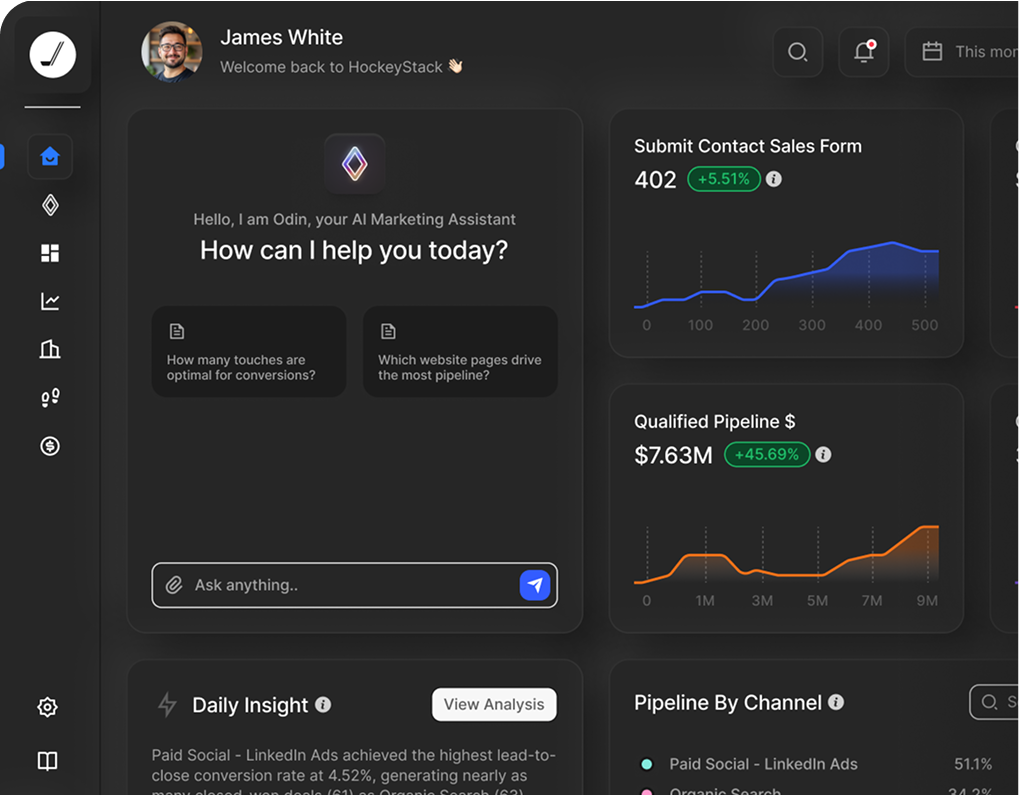
Ready to see HockeyStack in action?
HockeyStack turns all of your online and offline GTM data into visual buyer journeys and dashboards, AI-powered recommendations, and the industry’s best-performing account and lead scoring.
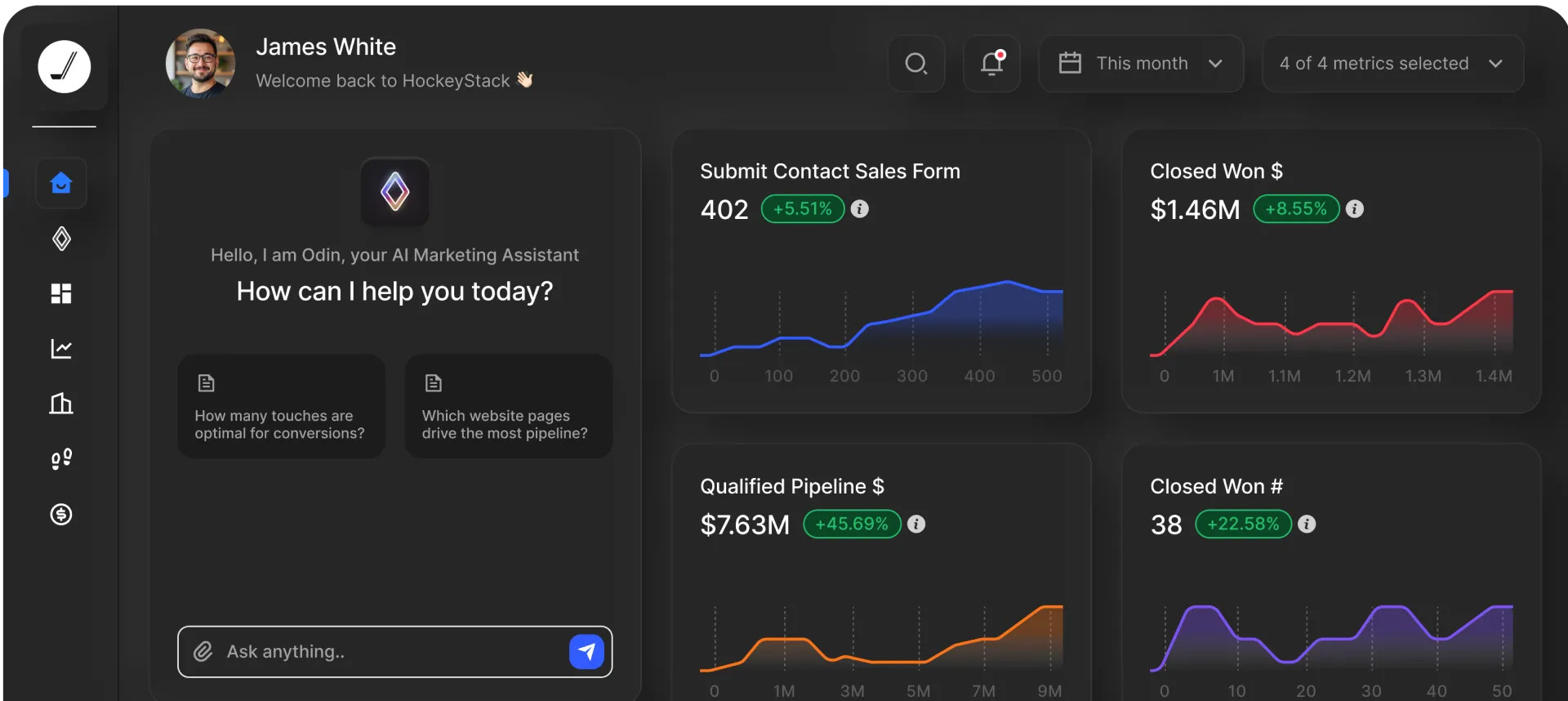
Ready to See HockeyStack in Action?
HockeyStack turns all of your online and offline GTM data into visual buyer journeys and dashboards, AI-powered recommendations, and the industry’s best-performing account and lead scoring.



